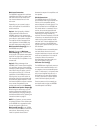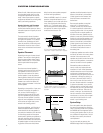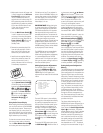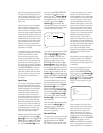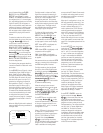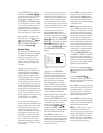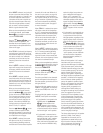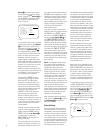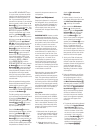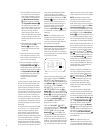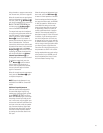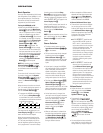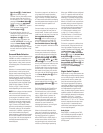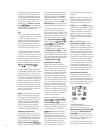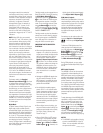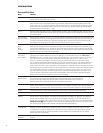
27
Once the DELAY ADJUST menu
is on your screen, note that the default
setting to enter the distances from the
speakers to the listening position is in
feet. If your measurements are in feet,
proceed to the next step; if your measure-
ments are made in meters, press the
¤
Button n until the on-screen
›
cursor
is at the
UNIT line on the menu. Then,
press the
‹
/
›
Buttons o so that
METER is highlighted. When the
change in measurement units is made,
press the
⁄
/
¤
Buttons n to return
the
›
cursor to the CENTER position.
With the on-screen
›
cursor pointing to
CENTER, press the
‹
/
›
Buttons
o until the distance from the cen-
ter speaker to the preferred listening
position is entered. Next, press the
¤
Button n to move the cursor to the
SURROUND line and use the
‹
/
›
Buttons o again to enter the
distance from the listening position to
the surround speakers. Finally, if the
system is configured for 7.1 operation
by entering
LARGE or SMALL
on the SURR BACK line of the
SPEAKER SETUP menu, press the
¤
Button n again and use the
‹
/
›
Buttons o to enter the distance
from the listening position to the back
surround speakers. Remember that this
last adjustment will only be needed
when you have surround back speakers
installed and Dolby Digital chosen as the
surround mode.
When the speaker-to-listening-position
distance has been entered for all active
speaker positions, press the
⁄
/
¤
Buttons n until the on-screen cursor is
next to
BACK TO MASTER MENU
and press the Set Button p.
The delay settings may be changed at
any time directly from the remote control
by pressing the
Delay Button .
CENTER DELAY will appear in the
Lower Display Line B, but you may
press the
⁄
/
¤
Buttons n to select
any of the speaker groups.
Press the
Set Button p when the
desired speaker group appears, and then
press the
⁄
/
¤
Buttons n again to
enter the distance from the speaker to
the listening position. Press the
Set
Button
p again to enter the data. You
may then press the
⁄
/
¤
Buttons n
to select another speaker group to repeat
the procedure as needed, or wait five
seconds for the system to return to nor-
mal operation.
Output Level Adjustment
Output level adjustment is a key part of
the configuration of any surround sound
product. It is particularly important for a
digital receiver such as the AVR580, as
correct outputs ensure that you hear
soundtracks with the proper directionality
and intensity.
IMPORTANT NOTE: Listeners are often
confused about the operation of the sur-
round channels. While some assume that
sound should always be coming from
each speaker, most of the time there will
be little or no sound in the surround
channels. This is because they are only
used when a movie director or sound
mixer specifically places sound there to
create ambience or a special effect, or
to continue action from the front of the
room to the rear. When the output levels
are properly set, it is normal for sur-
round speakers to operate only occa-
sionally. Artificially increasing the vol-
ume to the rear speakers may destroy
the illusion of an enveloping sound field
that duplicates the way
you hear sound in
a movie theater or concert hall.
Before beginning the output level adjust-
ment process, make certain that all
speaker connections have been properly
made. The system volume should be set
to the level that you will use during a typ-
ical listening session. While the AVR580
allows you to set output levels manually,
we recommend that the EzSet system be
used when the AVR is first installed, to
establish the initial level settings.
Using EzSet
JBL’s EzSet remote makes it possible to
quickly and accurately set the AVR580’s
output levels without the use of a sound
pressure meter, although manual adjust-
ment is also available. However, for the
easiest setup, follow these steps while
seated in the listening position that will
be used most often:
1. Make certain that all speaker posi-
tions have been properly configured
for their “large” or “small” settings
(as outlined above) and turn off the
OSD system if it is in use.
2. Adjust the volume so that it is at
-10dB, as shown in the on-screen
display or Main Information
Display
˜.
3. Hold the remote in front of you at
arm’s length, being sure not to cover
the
EzSet Sensor Microphone
at the top of the remote.
4. Press and hold the
SPL Selector
Button
for three seconds.
Release it when the
Program/SPL
Indicator
c stops flashing and
remains lit. Within five seconds,
press the
5 Button r on the
remote if your system is configured
for 5.1 operation with standard
speakers or the
7 Button r on the
remote if your system is configured
for 6.1/7.1 operation with a full
speaker complement including both
rear surround speakers. Once the cor-
rect channel configuration button has
been pressed, the test noise will be
heard from the front left speaker.
5. At this point, EzSet will take over,
adjusting the output level of each
channel so that when the process is
complete, all levels will be equal and
at the set reference point. This
process may take a few minutes,
depending on the extent of adjust-
ment required.
6. During the adjustment, you will see
the location of the channel position
being adjusted appear in the on-
screen display (if connected) and in
the
Main Information Display ˜,
alternating with a readout of the out-
put setting, relative to the reference
level, and in the
Speaker/Channel
Input Indicators
E where the let-
ters for the channel being adjusted
will flash to indicate the channel
from which the test tone should be
heard. As the adjustment proceeds,
a few things will happen simul-
taneously:
• The channel position being adjusted
will flash in the
Speaker/Channel
Input Indicators
E. If the test
noise is heard from a channel other
than the one shown in the indica-
tor, there is an error in the speaker
connections. If this is the case,
press the
Test Button i TWICE
to stop the adjustment. Then, turn
the unit off and verify that all
speakers are connected to the
proper
Outputs §¶ª‚.
41
44
36
37
37
37
37



